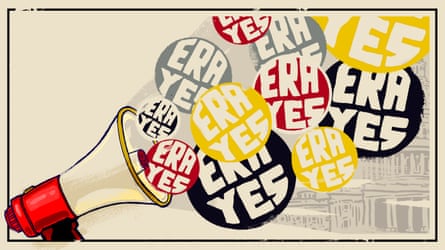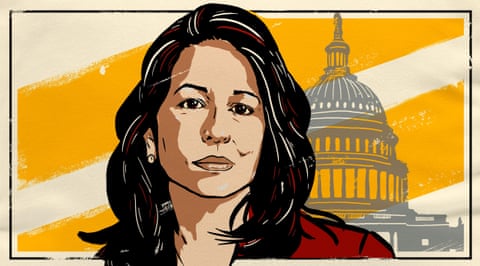Carol Robles-Román’s résumé boasts no shortage of impressive milestones, including a 12-year stint as deputy mayor for legal affairs and counsel to the former New York City mayor Michael Bloomberg.
But perhaps the real indicator of success, Robles-Román says jokingly, was when she was featured in the background of a video about constitutional equality for women – a clip that began circulating among her daughter’s classmates’ news feeds. Robles-Román’s daughter called her, half mortified and half beaming: “Mom, are you in a video with Alyssa Milano?”
“That’s when I knew I had ‘made it’ – when my daughter’s crowd at Georgetown University was watching a video about the Equal Rights Amendment on social media,” Robles-Román laughs.
Social media plays an integral role in getting the word out about a fact that, according to ERA Coalition polling data, 80% of Americans don’t know: women in the US don’t currently have guaranteed constitutional equality. As co-president and CEO of the ERA Coalition, Robles-Román hopes to correct this misconception – and to help enact legislation to make parity between men and women a constitutional right.
Social justice strides
For Robles-Román, the drive to fight for social justice is in her DNA. “I was raised in a social justice home,” she explains. “My mom came to the US in the ’50s, when Puerto Ricans were being treated terribly. She was this huge advocate for migrants and immigrants.” Ultimately, Robles-Román pursued a law degree in hopes of continuing her parents’ legacy.
Robles-Román has spent the bulk of her career in different arenas of the global fight for civil rights. During her tenure with Bloomberg, she worked to combat human trafficking and violence against women, as well as to support immigrants and anti-discrimination laws. Toward the end of her time working for the mayor, Robles-Román had an ominous sense: “I couldn’t describe it, but I just felt this tsunami coming against women,” she says. The feeling led her to dive directly into work focused on women’s rights, and eventually to accept a role as president and CEO of Legal Momentum, the oldest legal advocacy group for women in the country.
In Robles-Román’s experiences as a lawyer, she’d always felt the courtroom was ground zero for effecting change. But after reading co-president of the ERA Coalition Jessica Neuwirth’s book, Equal Means Equal, she decided to pivot her efforts towards even loftier goals. “I realized that no matter how many lawsuits I brought or Title IX actions I filed … I was just putting a finger in the dike, because women don’t have constitutional equality,” she says.
Robles-Román hopes to help people across every generation, demographic and political affiliation see the ERA as a basic, universal necessity. “This is the perennial no-brainer of civil rights issues,” she says. “It’s something we can all come together on.”
The modern women’s rights movement

The ERA Coalition, founded in 2014, taps into the power of the internet to garner support for the Equal Rights Amendment – legislation that adds language to the US constitution stipulating equal protections for men and women.
Though conversations about the ERA ignited in the 1970s, legislation failed to pass on a national scale. Today, 13 US states have yet to pass the ERA, although it will only take one more to reach the requisite 38 and ratify the amendment. This is the messaging behind Robles-Román and the ERA Coalition’s rallying cry: “One state to 38.”
Today’s digital era calls for an updated galvanization strategy, explains Robles-Román. “We have to use powerful voices, unorthodox voices, voices that have not been heard before,” she says, pointing out that many people who are affected by civil rights violations are women of color like herself. “As a general matter, we don’t tell, we don’t sue, we don’t report. We don’t have the cadre of federal lawyer contacts we can call who will say: ‘OK, I’ll [help you] vindicate your civil rights.’”
The ERA Coalition raises awareness and funds via T-shirt sales, “ERA Days” that encourage discussion about equal rights on university campuses and ERA Equality Road Shows in jurisdictions where the amendment hasn’t yet been ratified. During these shows, the organization “pulls out all the stops”, says Robles-Román. “We’re able to bring strong media support and celebrity voices together to promote advocacy [for the ERA] in a very powerful way.”
Celebrity endorsement for the ERA Coalition includes support from high-profile public figures like Milano, Meryl Streep and America Ferrera, who use hashtags like #EqualRightsNow to bring the organization’s message to a wide audience online. The endorsements – along with the ERA Coalition’s ongoing campaigns and rallies – have sparked national conversations about the ERA, both online and in front of Congress. The Milano video that Robles-Román’s daughter saw circulating on social media has racked up 1.4m views to date. And earlier in 2018, the ERA Coalition helped realize the first congressional hearing about the ERA in more than 33 years – a major win for women everywhere, Robles-Román says.
Eyes to the future
Robles-Román insists that despite disheartening political rhetoric, she remains hopeful for the future of equal rights in America. She has reason to feel this way, at least when it comes to passage of the ERA: data has found that 94% of Americans support constitutional equality for women.
She says that one of the top steps people can take to actively lend support is to call their legislators – particularly if they live in one of the states that hasn’t yet ratified the ERA. That list includes Alabama, Arizona, Arkansas, Florida, Georgia, Louisiana, Mississippi, Missouri, North Carolina, Oklahoma, South Carolina, Utah and Virginia. The ERA Coalition has created a useful map resource that outlines contact information for both co-sponsor and non-co-sponsor Congress members in each state.
“If you live in one of those states, you need to be on high alert that there’s work for you to do … if you’re a person of goodwill, and this is important to you, and your state is on that list, that’s a clarion call,” says Robles-Román.
“And this is a movement, make no mistake about it,” she says. “What we’re doing is putting the bells and whistles on it, so everybody knows about it.”
To support the ERA Coalition, donate here, take the ERA Pledge and reach out to your Congress members.
